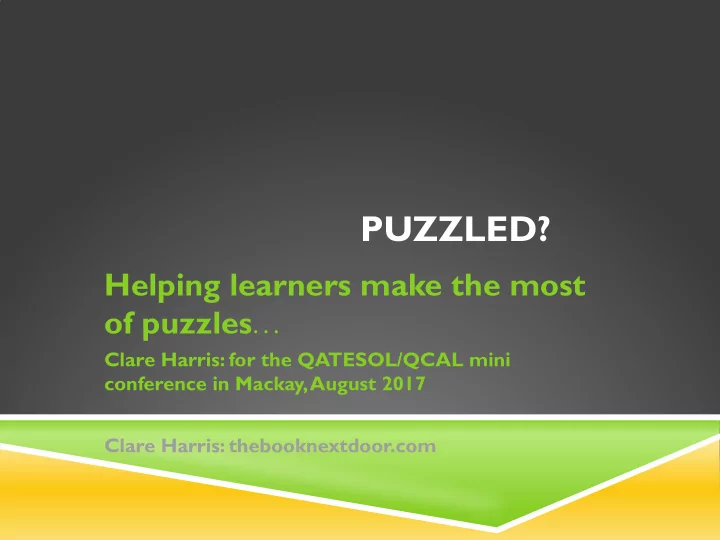

PUZZLED? Helping learners make the most of puzzles … Clare Harris: for the QATESOL/QCAL mini conference in Mackay, August 2017 Clare Harris: thebooknextdoor.com
WHAT I LIKE ABOUT PUZZLES: Authentic task Across cultures Collaborative or solitary Not tied to any age group, gender Not elitist
A POSITIVE ADDICTION? ‘The brain is ravenous for new information … We take pleasure in pattern finding … it’s a huge bit of what the cortex is primed to do … (Daniel Bor, Neuroscientist, interviewed by Time) As in online game mechanics: ‘variably-timed, earned rewards … are addictive’ (Markus Kolic, on Quora)
‘EXTRA EASY PUZZLES’ WAS INSPIRED BY MAGAZINE PUZZLES
WITH DIFFERENT PUZZLE TYPES, AND A ‘PAYOFF’ HIDDEN WORD
HOWEVER, ARE ELT PUZZLES REALLY AUTHENTIC? Look at the shape and numerous intersections of a magazine puzzle, compared to the puzzles that we as teachers create – this was pointed out by Warren Merkel in his 2016 TESOL Journal article. Should we try to replicate commercial crosswords? If we do, we have to accept the inclusion of words our learners will not know…
A COMMERCIAL CROSSWORD * … Simple, but includes: • kipper, • yak, • jig • mellow • idly
VS. AN ELT CROSSWORD … No neat shape Fewer word intersections (that allow answers to ‘appear’) ‘Word box’ may be offered (can be covered up)
SOME LEARNERS MAY STRUGGLE It could be that they need to understand puzzle concepts – or perhaps that artificial tasks don’t have much meaning for them? As pragmatic thinkers, they seek immediate relevance and opportunities to practise, rather than analytical tasks that ask them to isolate critical features and perform little academic ‘tricks’ like true/false, multiple choice’. (Helaine Marshall, on Hmong students, but I think it applies to other learners I have met.)
CONCEPTS LEARNERS NEED Reading instructions, puzzle types Across-down, numbering, intersection Tick off the words in the word box Does the word fit in the sentence? Does it fit the number of boxes available? Effect of ‘wrong word’, getting stuck Self checking, and the ‘hidden word’
COLLABORATIVE LANGUAGE Clue/answer/word box, hidden word It’s too long/short, it doesn’t fit / it doesn’t make sense, cross it off It’s your turn. What do you think? I’m stuck! Can anyone help? Back to work – is the break over?
‘COLLABORATIVE CRUCIVERBALISM’ ‘Adaptable to the classroom, this process involves locating a puzzle that is a suitable challenge (not impossible, not too easy, but like Goldilocks said, just right) and setting groups to work without the aid of a computer... Participants are encouraged to verbalize as they progress…’ (ie to think aloud) ( Charlie Sweet et al)
UNEXPECTED BENEFITS ‘ Crosswords can help disengaged young people learn to deal with frustration in learning – you are bound to get ‘stuck’ on a puzzle, or write in the wrong word, but you can learn to move beyond this…in a non-threatening context.’ ‘Learners got a lot out of writing their own crosswords – I gave them the words, but they had to write the clues and use a computer program to create the puzzle.’
A NATURAL PROGRESSION? Pair work Creating Puzzles puzzles puzzles
MAKING PUZZLES INTERACTIVE Working together to solve a puzzle Taking turns, as class/group/pair Playing ‘workplace lunch room’ and calling out clues Reading the clues to each other Pair work puzzles (information gap) Pair work puzzles you create Students create their own puzzles
LEARNERS CREATING PUZZLES Pair work puzzles are a ‘lead in’ to clue writing You can offer word lists with ‘built in’ grammatical features: opened, boxes, safety, quickly Some words may be better suited to wordfinds (I had trouble writing a clue for superannuation.) Computer programs create crosswords – but not the ‘hidden word’ – you have to do that yourself
PROGRAMS? Eclipse (for Windows) is free, no ads Teacher’s Corner Crossword Puzzle Maker (includes some premade clues) ESLActivities.com crossword generator Free Word Search Creator on BusyTeacher.org I’ve used Crossword Forge
SOME REFERENCES: Science explains why crossword puzzles are good for your health: http://www.lifehack.org/374975/science-explains-why-crossword-puzzles-are-good-for-your- mental-health (Sumaiya Kabir on Lifehack) One activity to develop 9 Creative Thinking Strategies: https://newforums.com/one-activity-develops-creative-thinking/ (Charlie Sweet) Why solving puzzles is fun: Q&A with Consciousness Researcher Daniel Bor: http://healthland.time.com/2012/09/21/why-solving-puzzles-is-fun-qa-with-consciousness- researcher-daniel-bor/ (Maia Szalavitz) The potential of crossword puzzles in aiding ELLs: (TESOL journal 2016 7/4 : Warren Merkel) T eaching Adult English Language Learners with Emerging Literacy Skills: a Discussion: https://lincs.ed.gov/lincs/discussions/englishlanguage/10teach_summary The impact of crossword puzzle teaching on vocabular retention: (M. Mohammadi) http://www.academia.edu/11003999/ IMPACT_OF_CROSSWORD_PUZZLE_TEACHING_ON_VOCABULARY_RETENTION
MORE REFERENCES A funny snippet of video would be the first 45 seconds of this ‘Two Ronnies’ sketch (the rest relies on an understanding of British class issues and double entendre jokes – and doesn’t support my claim that crosswords are not elitist!) https://www.youtube.com/watch?v=cVWdbO6FFfw Also mentioned in a nice article from the Guardian Crossword blog: https://www.theguardian.com/crosswords/crossword-blog/2012/sep/20/ crossword-blog-best-tv-gags-crosswords *The ‘Commercial Crossword’ photo comes from a That’s Life! crossword booklet – I really love this magazine for literacy/ABE learners, though it’s still too difficult for the ELT learners I encounter…
THANKS! HAPPY PUZZLING! Please stay in touch: info@thebooknextdoor.com
Recommend
More recommend